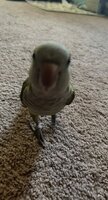sourbirdy
Moving in
- Joined
- 8/11/21
- Messages
- 6
first, onion (male? quaker parrot) is doing wonderful!  hes one and a half and just got a new, larger cage! he loves it. hes very playful, is trying out talking, and has fully figured out how to fly (which is a little stressful).
hes one and a half and just got a new, larger cage! he loves it. hes very playful, is trying out talking, and has fully figured out how to fly (which is a little stressful).
we are already working on recalling, hes not great at it yet but its better than nothing. he can do a few tricks (shake a bell, give kiss, dance party) and im looking for new helpful things to teach him.
hes a long looong way from being able to fly freely (which is something id love for him to be able to do once we get fully trained!) but i figured it wouldnt be bad to start laying fundamentals now. from what ive seen, getting a bird to fly to you is one of the most important things?
tldr: what are the most important/helpful things youve taught your bird in relation to flying? any tips/warnings/anything you would have wanted to know before working on flight training? ALSO opinions/reccomendations on harnesses/leashes? and how to introduce them to your bird? they look kind of uncomfortable :,)

we are already working on recalling, hes not great at it yet but its better than nothing. he can do a few tricks (shake a bell, give kiss, dance party) and im looking for new helpful things to teach him.
hes a long looong way from being able to fly freely (which is something id love for him to be able to do once we get fully trained!) but i figured it wouldnt be bad to start laying fundamentals now. from what ive seen, getting a bird to fly to you is one of the most important things?
tldr: what are the most important/helpful things youve taught your bird in relation to flying? any tips/warnings/anything you would have wanted to know before working on flight training? ALSO opinions/reccomendations on harnesses/leashes? and how to introduce them to your bird? they look kind of uncomfortable :,)


